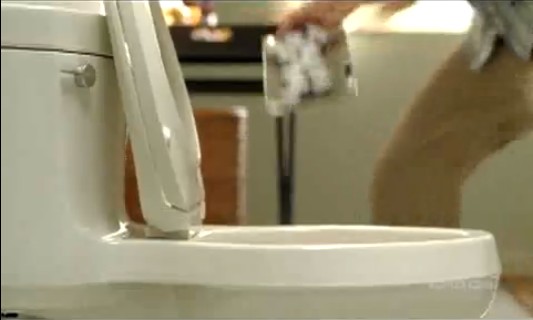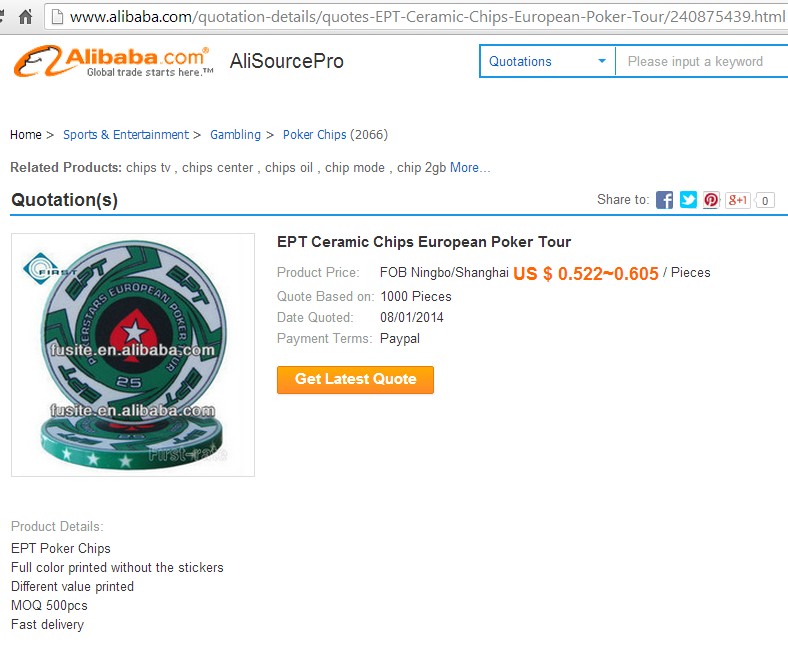Last Friday’s arrest of North Carolina’s Christian Lusardi for his alleged introduction of a large quantity of counterfeit poker chips into a major poker tournament at Atlantic City’s Borgata Hotel Casino & Spa continues to send waves of concern throughout the poker world. If proven in court, Lusardi’s brazen (if foolish) ploy has the potential to cause impact far beyond the actual scope of the crime he committed.
 Lusardi is alleged to have introduced about 200 faked “5,000” tournament chips during the Day 1C flight of the opening event of the 2014 Borgata Winter Poker Open. The event, with a $560 buy-in, drew 4,814 entrants and was the second largest tourney in the series based on prize pool, narrowly behind the series’ championship event. The massive field built a purse well over $2 million, some $1.4 million remains unrewarded after New Jersey Division of Gaming enforcement regulators ordered the tournament suspended, then cancelled.
Lusardi is alleged to have introduced about 200 faked “5,000” tournament chips during the Day 1C flight of the opening event of the 2014 Borgata Winter Poker Open. The event, with a $560 buy-in, drew 4,814 entrants and was the second largest tourney in the series based on prize pool, narrowly behind the series’ championship event. The massive field built a purse well over $2 million, some $1.4 million remains unrewarded after New Jersey Division of Gaming enforcement regulators ordered the tournament suspended, then cancelled.
Perhaps Lusardi, if the charges against him are proven, thought he might score a life-changing win, though the real changes to his life are likely to be far more adverse. Lusardi likely introduced as large quantity of his fake chips during his Day 1C flight, playing plenty of pots and ending the opening day’s play with more than 500,000 in reported chips, something on the order of 40% more than either the Flight 1A or 1B leaders.
That Day 1C “performance” was enough to snag Lusardi a reported flight-leader bonus unofficially reported as $2,000, and when Lusardi busted out late on Day 2 (perhaps in panic mode after news of the counterfeit chips’ discovery began spreading within the Borgata), he collected a little more than $6,800. So all told, Lusardi pocketed about $8,800, less expenses.
Those expenses included at least $560 buy-in, his travel to Atlantic City, and his lodging at the nearby Harrah’s Atlantic City, where another $2.7 million in fake chips was discovered, after having been attempted to be flushed down the toilet in Lusardi’s hotel room. It seems that Lusardi had been able to introduce only a small percentage of his fake chips into the Borgata tourney, then panicked and tried to destroy the remaining evidence.

How about poker chips?
(Note to Lusardi: Those fancy “Jo’s Plumbing” commercials from Kohler wherein the guy flushes all sorts of strange objects down his toilet, and nothing clogs it? They don’t have those toilets in casino hotel rooms.)
So Lusardi’s not too bright; as numerous forum posters pointed out, he was only a short walk away from a giant pond known as the Atlantic Ocean, where he could have discarded those chips with ease. Sure, someone might have found them while wading or swimming, but not ’til summer.
And so the plot unraveled. The plumbing problem occurred in Lusardi’s Harrah’s room, Harrah’s notified the Borgata, and DGE investigators had a head start as to who to look for when checking security tapes of the cheating.
However, that’s far from the whole story. Lusardi’s dumb-assed cheating ploy unwittingly shed increased light on the weakest links in poker-tournament security, that of ongoing series where chips are surreptitiously introduced from unofficial sources and have the effect to compromise fair play.
Such illicit chips are a problem, and have been for a long time. Usually such cheating ploys take the form of chips swiped from other tournaments — but taken from the same or similar “no value” chip sets being used repeatedly by the casino — and reintroduced into an event such as this at a more opportune time.
I’ve experienced it first-hand, in a WSOP Circuit H.O.R.S.E. event at Horseshoe Hammond, outside Chicago. Late on Day 1, our dealer suddenly jumped up and screamed “Floor!”, then showed the arriving TD the two yellow 1,000 chips which had appeared in the pot then being contested. They were WSOPC yellow 1,000 tourney chips, alright, but from another of the three official chip sets being used by the WSOPC at that venue.
What happened is that the TD allowed play to continue, in effect letting the crook get away with it. And off the record, I believe the cheat was the gentleman sitting to my immediate right, in the 2 seat, who had been constantly riffling chips, and who I oddly remember a short while earlier suddenly had a bit bigger stack than I’d seen before. But I wasn’t 100% sure, and I thus couldn’t make a public accusation. The guy busted later anyway, karma at least working a bit that evening.
Yet all this occurred with an experienced dealer and tourney staff, and not the free-for-all of inexperienced dealers that seemed to have occurred at the Borgata. The massive 4,800-plus field stretched the Borgata’s capabilities to the brink, and according to many reports, security was as lax as the dealers were unskilled. Such a situation is rife for exploitation by cheaters, and if anyone believes that Lusardi is the first one to try this sort of cheating, they’re fooling themselves.
Most tournament-series chips are “stickered” chips, as opposed to custom-cast and -printed chips, just because it’s cheaper to produce them that way. It’s also easier to counterfeit stickered chips, but make no mistake; most readily available chips, stickered or not, can be counterfeited. It’s with that knowledge that major poker tournament venues the world over now probably have to reevaluate the security of their offerings, and that’s directly attributable to the attention Lusardi’s caper has received.
If there’s an unbelievable little aside to the whole Lusardi caper, it’s that a 2+2 forum posted may have uncovered the source of Lusardi’s chips. This page on the Asian online manufacturing bazaar AliBaba.com amazingly still shows a quote for counterfeit chips showing a blurred but obvious “Borgata” sticker, along with a response for a quote obtained last October by one… “Christian Lusardi”.
It would be one hell of a troll job if someone managed to fake that, including the info for the Chinese manufacturing firm, the Junyi Hardware and Plastic Company, that is clearly making the counterfeits. I’m inclined to believe that this is real, and Lusardi likely obtained his probable order of 1,000 fake Borgata chips right there, for about $85, plus international chipping.
As if Junyi were alone in producing fakes. The world’s business is plagued with Chinese fakes and counterfeits and pirated goods, as America’s entertainment industry can long attest — to the tune of billions and billions of dollars lost. The effects of such massive, systemic theft and fraud on the world’s economy is almost incalculable, and it affects everyone’s life, make no mistake about it.
AliBaba is one of the foremost visible portals for such counterfeiting and pirating, if one knows where to look. When one realizes that a significant share of China’s economy is built on such theft and fraud, and that China thus has little incentive to adhere to international agreements except in the most extreme cases, it makes the protests of someone such as Allen Kessler laughable. Kessler, poker’s “ComplainSaw”… errr, “Chainsaw”, posted that the Borgata should somehow get their lawyers together and put AliBaba and all those crooked, low-balling Chinese chip counterfeiters out of business.
 Powerful as the Borgata might be in a corporate legal sense, it’s not a whiff as powerful as the collective of the United States’ entertainment and software industries. And if all those corporate giants can’t slow down the counterfeiting/pirating onslaught over several decades, the Borgata’s not going to do any better.
Powerful as the Borgata might be in a corporate legal sense, it’s not a whiff as powerful as the collective of the United States’ entertainment and software industries. And if all those corporate giants can’t slow down the counterfeiting/pirating onslaught over several decades, the Borgata’s not going to do any better.
If one searches AliBaba, one can see that Borgata chips aren’t the only ones being openly, blatantly faked. Here’s a link to to another Chinese manufacturer openly hawking EPT (European Poker Tour) tourney-chip knockoffs… and those are sticker-free, too, which cost a little more to make.
Here’s yet another showing a chip set with WSOP logo stickers, though they look more like the souvenir chips one finds in the gift shop rather than the ones the WSOP actually employs in events. And there’s the question of whether or not these are even good fakes, and the answer to that is that they might not have to be.
One of the problems in the Lusardi / Borgata affair was Borgata staffers’ seemingly cavalier attitude toward the fake chips, simply swapping them out for real ones despite the chips being brought to the floor’s attention by several players. Many of the inexperienced dealers wouldn’t even have recognized the fake chips on their own without players’ help, and that’s in contrast to the WSOPC’s experienced traveling dealer crew, which was quick to spot the chip problem I experienced — but left them in anyway.
Now, add in this kicker. Lusardi, assuming the charges against him are true, was dumb punk who stuck something less than $150 into a poorly thought out ploy to cheat a tourney on the cheap. Now imagine a cheating crew with deeper pockets, access to tourney chips at major venues, and the willingness to shop AliBaba and other sites and choose a pirate vendor willing to make chips to order. Dozens of AliBaba vendors do such manufacturing, and many of them offer chips in varying weights and materials. And AliBaba is far from the only such pirate-manufacturing outpost on the Internet.
It’s a problem. It’s always been there, but now it finally have to be addressed.
Major tournament venues are going to have beef up their security measures in several areas, from additional floor staff, better trained dealers and security, to a more frequent recycling and possible upgrading of the tournament chips themselves. The larger the tourney (in terms of either player count or prize fund), the greater the risk.
And all that is going to add operational cost. Because what can’t be allowed to happen is a recurrence of what’s happening at the Borgata, where the final 27 players may get shafted, losing out on a collective $1.4 million in prize money due to the tourney’s cancellation, through no fault of their own (assuming none of the remaining 27 were in cahoots with Lusardi). Players eliminated on Day 2 and in some portions of the Day 1C flight of that event also have legitimate claims of unfair play, though to date no cheating has been confirmed within the 1A or 1B flights. It’s hard to imagine a legitimate refund mechanism for those 1A / 1B players.
Are RFID-implanted (Radio Frequency IDentification) chips the answer, as many commenters on the situation have opined? Probably not. Despite those chips’ significantly higher cost, they are not foolproof, and they are a one-directional fix that would coincidentally slow down an event’s pace by a significant degree. Over time, RFID chips could also be faked or counterfeited. Another possible solution is a much thicker layer of hands-on security, a tighter control over events and chips by tourney operational staff. That, too, has drawbacks and security holes.
What seems for sure is that another layer of cat-and-mouse security efforts is about to unfold, with some added expense for everyone involved. Which means, of course, is that the added expense will ultimately be born by the players themselves — just like in shoplifting and other forms of theft. All that adds up to a bit of sad news for poker.
100% up to $3,000 Bonus
Bovada is our most recommended ONLINE CASINO and POKER ROOM for US players with excellent deposit options. Get your 100% signup bonus today.



Leave a Reply
You must be logged in to post a comment.